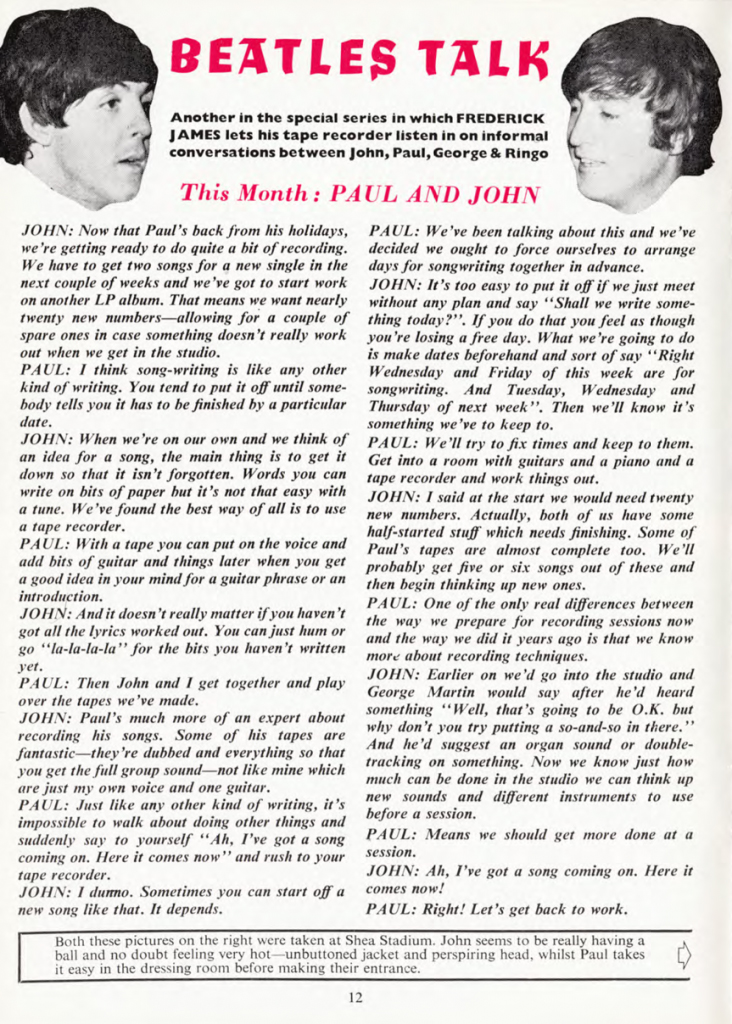April 1966
Interview for The Beatles Monthly Book
Beatles Talk - April 1966
Press interview • Interview of The Beatles
Last updated on August 5, 2023
April 1966
Press interview • Interview of The Beatles
Last updated on August 5, 2023
Previous interview Mar 25, 1966 • The Beatles interview for Radio Caroline
Article April 1966 • John Lennon and Paul McCartney win five BMI Awards each
Article Apr 01, 1966 • John Lennon and Paul McCartney visit Indica Books & Gallery
Interview April 1966 • The Beatles interview for The Beatles Monthly Book
Interview April 1966 • Paul McCartney interview for Rave Magazine
October 2000 • From MOJO
October 1999 • From MOJO
“The Beatles Anthology 1” press conference
Nov 20, 1995
Calm down! It's The Beatles. Their only interview!
December 1995 • From Q Magazine
Andy Gray talks to the Beatles, 1968
Jul 13, 1968 • From New Musical Express
Interview for The Kenny Everett Show
Jun 09, 1968 • From BBC Radio 1
Interview for The Village Voice
May 16, 1968 • From The Village Voice
May 14, 1968 • From WNDT
NYC Press Conference Announcing Apple
May 14, 1968
Interview for The Tonight Show
May 14, 1968 • From NBC
This interview remains the property of the respective copyright owner, and no implication of ownership by us is intended or should be inferred. Any copyright owner who wants something removed should contact us and we will do so immediately.
BEATLES TALK
Another in the special series in which FREDERICK JAMES lets his tape recorder listen in on informal conversations between John, Paul, George & Ringo
This Month: PAUL AND JOHN
JOHN: Now that Paul’s back from his holidays, we’re getting ready to do quite a bit of recording. We have to get two songs for a new single in the next couple of weeks and we’ve got to start work on another LP album. That means we want nearly twenty new numbers-allowing for a couple of spare ones in case something doesn’t really work out when we get in the studio.
PAUL: I think songwriting is like any other kind of writing. You tend to put it off until somebody tells you it has to be finished by a particular date.
JOHN: When we’re on our own and we think of an idea for a song, the main thing is to get it down so that it isn’t forgotten. Words you can write on bits of paper but it’s not that easy with a tune. We’ve found the best way of all is to use a tape recorder.
PAUL: With a tape you can put on the voice and add bits of guitar and things later when you get a good idea in your mind for a guitar phrase or an introduction.
JOHN: And it doesn’t really matter if you haven’t got all the lyrics worked out. You can just hum or go “la-la-la-la” for the bits you haven’t written yet.
PAUL: Then John and I get together and play over the tapes we’ve made.
JOHN: Paul’s much more of an expert about recording his songs. Some of his tapes are fantastic-they’re dubbed and everything so that you get the full group sound-not like mine which are just my own voice and one guitar.
PAUL: Just like any other kind of writing, it’s impossible to walk about doing other things and suddenly say to yourself “Ah, I’ve got a song coming on. Here it comes now” and rush to your tape recorder.
JOHN: I dunno. Sometimes you can start off a new song like that. It depends.
PAUL: We’ve been talking about this and we’ve decided we ought to force ourselves to arrange days for songwriting together in advance.
JOHN: It’s too easy to put it off if we just meet without any plan and say “Shall we write something today?”. If you do that you feel as though you’re losing a free day. What we’re going to do is make dates beforehand and sort of say “Right Wednesday and Friday of this week are for songwriting. And Tuesday, Wednesday and Thursday of next week”. Then we’ll know it’s something we’ve to keep to.
PAUL: We’ll try to fix times and keep to them. Get into a room with guitars and a piano and a tape recorder and work things out.
JOHN: I said at the start we would need twenty new numbers. Actually, both of us have some. half-started stuff which needs finishing. Some of Paul’s tapes are almost complete too. We’ll probably get five or six songs out of these and then begin thinking up new ones.
PAUL: One of the only real differences between the way we prepare for recording sessions now and the way we did it years ago is that we know more about recording techniques.
JOHN: Earlier on we’d go into the studio and George Martin would say after he’d heard something “Well, that’s going to be O.K. but why don’t you try putting a so-and-so in there.” And he’d suggest an organ sound or doubletracking on something. Now we know just how much can be done in the studio we can think up new sounds and different instruments to use before a session.
PAUL: Means we should get more done at a session.
JOHN: Ah, I’ve got a song coming on. Here it comes now!
PAUL: Right! Let’s get back to work.


Notice any inaccuracies on this page? Have additional insights or ideas for new content? Or just want to share your thoughts? We value your feedback! Please use the form below to get in touch with us.